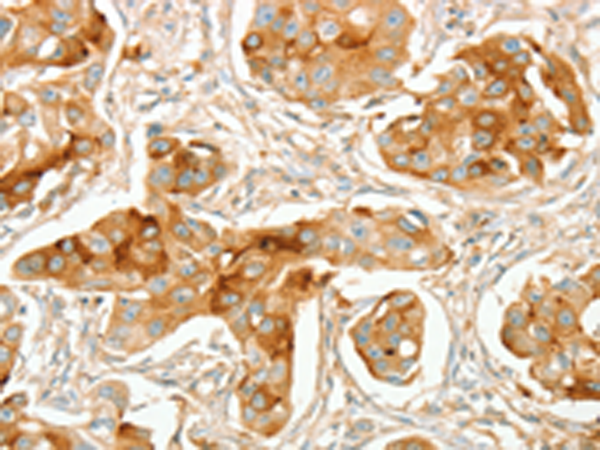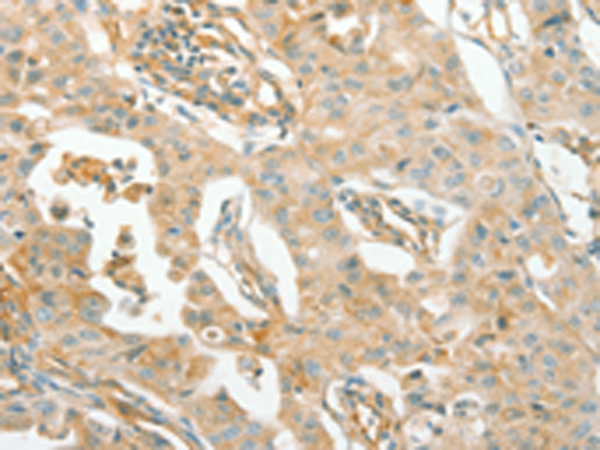


| WB | 咨询技术 | Human,Mouse,Rat |
| IF | 咨询技术 | Human,Mouse,Rat |
| IHC | 1/100-1/300 | Human,Mouse,Rat |
| ICC | 技术咨询 | Human,Mouse,Rat |
| FCM | 咨询技术 | Human,Mouse,Rat |
| Elisa | 1/2000-1/5000 | Human,Mouse,Rat |
| Aliases | DCP; ICH; ACE1; DCP1; CD143; MVCD3 |
| WB Predicted band size | 150 kDa |
| Host/Isotype | Rabbit IgG |
| Antibody Type | Primary antibody |
| Storage | Store at 4°C short term. Aliquot and store at -20°C long term. Avoid freeze/thaw cycles. |
| Species Reactivity | Human, Mouse, Rat |
| Immunogen | Synthetic peptide of human ACE |
| Formulation | Purified antibody in PBS with 0.05% sodium azide and 50% glycerol. |
+ +
以下是关于ACE抗体的3篇参考文献,简要列举如下:
---
1. **文献名称**: "Autoantibodies Against Angiotensin-Converting Enzyme: A Novel Biomarker in Sarcoidosis"
**作者**: Studdy, P.R. et al.
**摘要**: 研究报道结节病患者血清中存在抗ACE自身抗体,可能干扰传统ACE活性检测,并提出此类抗体或可作为疾病特异性生物标志物。
2. **文献名称**: "Monoclonal Antibodies to Human Angiotensin-Converting Enzyme: Tools for Structural and Functional Analysis"
**作者**: Danilov, S.M. et al.
**摘要**: 开发并表征了针对人ACE的单克隆抗体,用于研究ACE的活性位点、结构域分布及其在血管内皮细胞中的表达模式。
3. **文献名称**: "Anti-ACE Antibodies in Systemic Sclerosis: Association with Clinical Manifestations"
**作者**: Tiev, K.P. et al.
**摘要**: 发现系统性硬化症患者中抗ACE抗体的阳性率显著升高,并与肺纤维化等严重并发症相关,提示其在疾病进展中的潜在作用。
---
以上文献聚焦于ACE抗体的检测方法学、临床意义及病理机制,覆盖自身免疫疾病和检测技术应用等领域。
**Background of ACE Antibodies**
ACE (Angiotensin-Converting Enzyme) is a key component of the renin-angiotensin system (RAS), regulating blood pressure and electrolyte balance by converting angiotensin I to angiotensin II, a potent vasoconstrictor. ACE also degrades bradykinin, influencing vascular and inflammatory responses. Antibodies targeting ACE are critical tools in studying its physiological roles, pathological associations (e.g., hypertension, cardiovascular diseases), and therapeutic applications.
ACE antibodies are typically developed as monoclonal or polyclonal reagents, enabling the detection and quantification of ACE in tissues, serum, or cell cultures via techniques like ELISA, Western blot, and immunohistochemistry. Research highlights ACE's dual role in COVID-19: while ACE2 serves as the SARS-CoV-2 receptor, ACE inhibitors may modulate disease outcomes. Additionally, ACE overexpression is observed in sarcoidosis, where serum ACE levels serve as a diagnostic biomarker.
Clinically, ACE antibody-based assays aid in diagnosing granulomatous diseases and monitoring therapeutic responses. In drug development, ACE antibodies help evaluate inhibitors (e.g., captopril) used to treat hypertension and heart failure. Recent studies also explore ACE's involvement in metabolic syndromes and cancer progression.
Overall, ACE antibodies are indispensable in both basic research and clinical practice, bridging mechanistic insights into RAS-related pathways and advancing diagnostic or therapeutic innovations. Commercial and custom ACE antibodies continue to support diverse biomedical applications.
(Word count: 250)
×